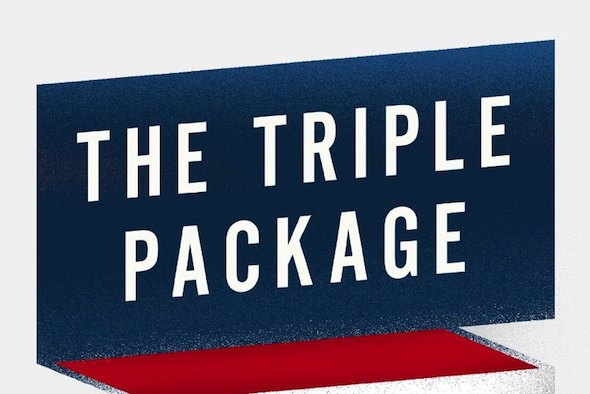|
To see long excerpts from “The Triple Package” at Google Books, click here.
|
“The Triple Package: How Three Unlikely Traits Explain the Rise and Fall of Cultural Groups in America”
A book by Amy Chua and Jed Rubenfeld
Amy Chua is no stranger to controversy. Her 2011 manifesto for the superiority of Chinese-style parenting, “Battle Hymn of the Tiger Mother,” shocked and outraged many readers. Some of the techniques Chua used with her daughters — referring to them as “garbage” or refusing to accept the 4-year-old’s hand-drawn birthday card because “I deserve better than this” — led not a few to denounce Chua as a monster. Her dogmatic, tough-love strategy advises that “the only activities your children should be permitted to do are those in which they can eventually win a medal; and … that medal must be gold.”
Now her eldest daughter is at Harvard, and Chua and her husband, fellow Yale Law School professor Jed Rubenfeld, are again plunging headlong into controversial territory and, undoubtedly, a wave of controversy-driven book sales. Reading their new title, “The Triple Package,” many will wonder why the couple didn’t take their parenting advice to heart: Readers deserve a better book than this.
Chua and Rubenfeld seek to explain why certain cultural groups in America “do strikingly better than others in terms of wealth, position and other conventional measures of success.” They argue that eight groups are exemplary in this regard — Cubans, East Asians, Indians, Jews, Lebanese, Mormons, Nigerians and Persians — because they share a set of “unlikely” cultural characteristics.
These characteristics — transparently trademarked as The Triple Package (always in capitals) — are the same ones we’ve been hearing about since Max Weber’s “The Protestant Ethic and the Spirit of Capitalism” was published nearly a century ago: a belief in your own group’s self-worth and superiority; “an anxious uncertainty about your worth or place in society”; and the discipline to resist temptation and endure in the face of opposition, sacrificing short-term comfort and pleasures for a long-range payoff. The first two traits — shortened to “superiority” and “insecurity” — create driven personalities, an observation Chua and Rubenfeld keep repeating as if it were a surprising discovery, rather than a central theme of countless literary, dramatic and journalistic works through the centuries.
Other groups, of course, don’t exhibit the Triple Package: Appalachian people, African-Americans and those who’ve embraced the allegedly permissive and hedonistic “mainstream, post-1960s liberal American principles” that have, we later learn, led to our national downfall. America, we are told, must regain the Triple Package it lost in the secure, undisciplined go-go years between the collapse of the Berlin Wall and Sept. 11, 2001, as if the country itself were a cultural group.
This is not a carefully researched book. The couple fails even to convincingly establish that their chosen groups are particularly successful by the conventional metrics of wealth, education and the collection of status symbols. Their evidence is often anecdotal or fragmentary — lists of corporate CEOs who happen to be members of a chosen group or, in the case of Jewish Americans, the observation that they are grossly over-represented among Tony Award winners. They decree that Mormons are “hitting it out of the park with conventional success” based on lists of individuals who’ve reached political summits (Mitt Romney, Harry Reid) or corporate ones (J.W. Marriott, Gary Crittenden), even as they admit that Mormons are actually less likely than the average American household to be making more than $100,000 a year.
Indeed, if you probe the source of much of their data — the Pew Religion & Public Life Project — you’ll learn that members of the Church of Jesus Christ of Latter-day Saints are statistically less likely than other Americans to graduate from college or have a post-graduate degree, and that atheists are almost twice as likely to have six-figure incomes. The authors try to explain away the income figures by observing that Mormon wives are discouraged from having careers, but if we’re to judge people’s success purely by the vulgar metric of money, choosing not to be a two-income family would have to be categorized as an undesirable, unsuccessful cultural practice.
Similarly, we’re told that Cuban Americans are successful because they also embody Triple Package values, even as the authors admit that only the original post-revolutionary exile wave has shown unusual statistical performance and that “New Cubans” who arrived since 1990 “have fared no better — indeed on some dimensions worse — than other Hispanics.” They also admit that this initial 1959-73 immigration group had some unusual advantages: 25 percent were judges, lawyers and professionals, and an additional 12 percent were managers and executives. “Some had attended the finest Havana private schools; some knew English; some had vacationed in the United States,” they write. But they do not explore the nagging question this raises: Might the successes of the exiles have more to do with their relative class, education and social advantages than their Triple Package ones?
Indeed, this is the question that haunts the entire analysis. Helpful though the Triple Package merits might be, many of America’s most successful groups seized and retained control by entirely different means. The English Barbadians who founded Charleston, S.C., and by extension the culture of the Deep Southern elite were as a group richer than any other in British North America and the early republic, and had an effective monopoly control over the political and economic life of a vast region; this was achieved through a ruthless, racially based slave system whose leaders were contemptuous of controls placed on their impulses. The Northeastern Anglo-Protestant elite continued to thrive generations after they abandoned the Triple Package practices of their Puritan forebears because they built exclusionary social institutions and practices that passed the advantages of wealth, elite education and social networks on to their progeny. Even today you can hear the echo of that in the Pew Religion & Public Life Project, wherein the Christian denominations with the highest proportion of six-figure households are mainline Anglicans (39 percent), Episcopalians (35 percent) and Presbyterians (28 percent). (The figure for Mormons, by comparison, is 16 percent.)
Chua and Rubenfeld wind up on even thinner ice when they turn their attention to an “unsuccessful” cultural group: the people of Appalachia. After reeling off statistics establishing the region’s relative poverty, lack of education, and high rates of drug use and teenage pregnancy, they note that the region “is not a Triple Package culture.” While insecure, its people lack a “deeply internalized sense of superiority vis-a-vis the rest of America” and show “disturbing signs of impulse control’s opposite.” The authors then take great pains to declare that the “absence of the Triple Package did not cause poverty in Appalachia,” but rather that the culture’s dejection, fatalism and “grabbing of immediate gratification” are supposedly results of 19th- and 20th-century economic dislocations.
This tidy analysis fails to account for the fact that Greater Appalachia’s cultural characteristics — and the exploitation of its people — date back to the middle decades of the 18th century, when tens of thousands of settlers from the war-torn borderlands of Ulster, the English Marches and the Scottish Lowlands poured into the American backcountry, bringing with them a powerful cultural package of their own that has shaped American culture at least as profoundly as the Puritan legacy has. One could devise lengthy lists of Scotch-Irish CEOs, military leaders, presidents and whatnot — and remark upon their over-representation in the Country Music Awards and as winners of the Congressional Medal of Honor — but the point would only be to show the methodological quicksand upon which the Triple Package thesis has been constructed.
In “Battle Hymn,” we were famously told that “an A-minus is a bad grade.” One wonders what Chua and Rubenfeld will make of an F.
Colin Woodard is the author of four books, including “American Nations: A History of the Eleven Rival Regional Cultures of North.”
©2014, Washington Post Book World Service/Washington Post Writers Group






You need to be a supporter to comment.
There are currently no responses to this article.
Be the first to respond.